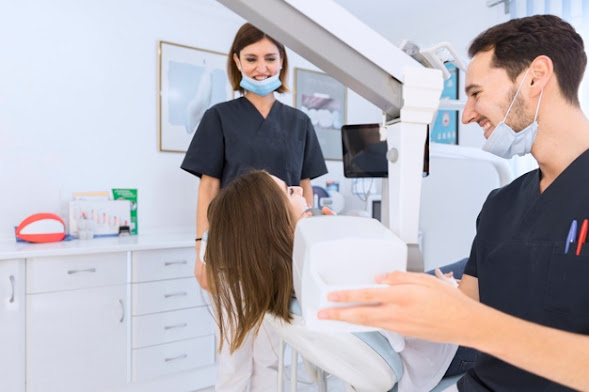Dental Hygiene Services: Promoting Optimal Oral Health
Summary: In this comprehensive guide, we will explore various dental hygiene services and their importance in preserving your teeth and gums.
Maintaining proper dental hygiene is crucial for a healthy smile and overall well-being. Dental hygiene services focus on preventive care, education, and treatments that help patients achieve and maintain optimal oral health. Here is dental hygiene services Rosarito that majorly covers in oral health care:
Professional Teeth Cleaning
Professional teeth cleaning, or dental prophylaxis, is a basic dental hygiene service. During this procedure, a dental hygienist will remove plaque, tartar, and stains from your teeth. The cleaning process involves scaling to eliminate hardened plaque and tartar, followed by polishing to give your teeth a smooth and clean surface. Regular professional cleanings are vital to prevent gum disease, cavities, and other oral health issues.
Oral Examinations and Assessments
Oral examinations and assessments play a crucial role in dental hygiene services. Dentists and dental hygienists perform thorough evaluations of your teeth, gums, and oral tissues to identify any signs of dental problems. They check for cavities, gum disease, oral cancer, and other issues. These assessments allow early detection and prompt treatment, ensuring the best possible outcomes for your oral health.
Dental X-Rays and Imaging
Dental X-rays and imaging are essential tools in dental hygiene services. They provide a more comprehensive view of your oral structures, enabling dentists to diagnose hidden problems such as impacted teeth, bone loss, and cysts. X-rays help plan treatments, monitor growth and development, and assess the overall health of your teeth and jawbone.
Preventive Education and Patient Counseling
Dental hygiene services emphasize preventive education and patient counseling to promote healthy habits and oral care practices. Dental professionals guide proper brushing and flossing techniques, the importance of a balanced diet, and the avoidance of harmful habits like smoking or excessive sugar consumption. Educating patients about the connection between oral health and overall health empowers them to take control of their dental well-being.
Gum Disease Treatment
Gum disease, or periodontal disease, is a common oral health issue requiring professional intervention. Dental hygienists provide non-surgical gum diseases treatments such as scaling and root planing to remove plaque and tartar buildup beneath the gum line. They may also recommend antimicrobial rinses or localized antibiotics to combat bacterial infection and promote gum healing.
Fluoride Treatments and Sealants
Fluoride treatments and sealants are preventive dental hygiene services designed to protect teeth from decay. Fluoride applications strengthen tooth enamel, making it more resistant to acid attacks and cavities. Dental sealants are thin protective coatings applied to the chewing surfaces of molars and premolars to seal out bacteria and food particles, reducing the risk of cavities in these vulnerable areas.
Frequently Asked Questions (FAQs)
Q1: How often should I have professional teeth cleaning?
It is generally recommended to have a professional tooth cleaning every six months. However, the frequency may vary based on your individual oral health needs. Your dentist or dental hygienist will evaluate your oral condition and recommend the appropriate cleaning schedule for you.
Q2: Are dental X-rays safe?
Dental X-rays emit deficient levels of radiation and are considered safe. Modern dental practices utilize digital X-rays that further reduce radiation exposure. Additionally, lead aprons and thyroid collars are used to protect patients from unnecessary radiation exposure during the imaging process.
Q3: Are dental sealants only for children?
While dental sealants are commonly applied to children's teeth, they can also benefit adults prone to developing cavities on the chewing surfaces of their molars and premolars. Sealants provide an extra layer of protection regardless of age, reducing the risk of decay and preserving the natural tooth structure.
Q4: How can I maintain good dental hygiene at home?
Maintaining good dental hygiene at dental health care group involves brushing your teeth at least twice a day with fluoride toothpaste, flossing daily, and using an antimicrobial mouthwash. It is also essential to maintain a balanced diet, limit sugary foods and beverages, and visit your dentist regularly for check-ups and cleanings.
Q5: Are professional teeth cleaning painful?
Professional teeth cleaning is generally painless. You may experience some discomfort or sensitivity during the process, especially if you have gum disease or sensitive teeth. However, dental professionals prioritize your comfort and use techniques to minimize discomfort. Local anesthesia can be used if necessary.
Dental hygiene services play a critical role in maintaining optimal oral health. From professional teeth cleanings to preventive education and gum disease treatments, these services help prevent dental problems, detect issues early on, and ensure a healthy smile. By practicing good dental hygiene at home and visiting your dental hygienist regularly, you can enjoy the benefits of solid teeth, healthy gums, and a confident smile for years to come.


Comments
Post a Comment